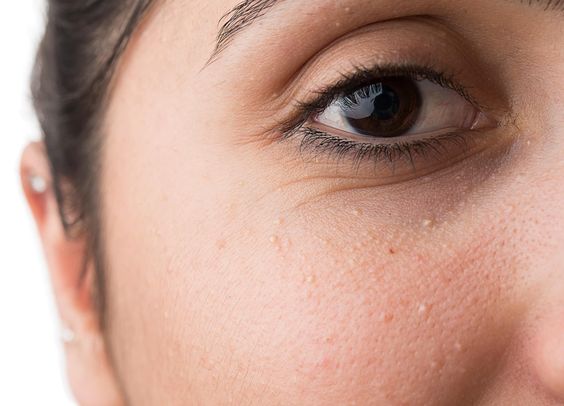Introduction:
Milia are small, white bumps that commonly appear on the skin, often around the eyes, nose, and cheeks. These harmless cysts are filled with keratin, a protein found in skin. While milia can affect people of all ages, they are particularly common in newborns.

Often mistaken for whiteheads, milia are firm and don't easily squeeze out like acne. They typically don't cause discomfort or pain and often disappear on their own within a few weeks or months, especially in infants. However, for some, milia can be persistent and affect appearance.
What Causes Milia?
The exact cause of milia is not always clear, but several factors can contribute to their formation:
- Trapped Keratin: Milia develop when keratin gets trapped beneath the skin's surface, forming tiny cysts.
- Skin Damage: Burns, blisters, dermabrasion, and other forms of skin damage can trigger milia development.
- Sun Exposure: Prolonged sun exposure can increase the risk of milia.
- Certain Skin Products: Heavy skincare products or cosmetics can sometimes clog pores and contribute to milia formation.
Treatment Options:
Most cases of milia resolve independently and don't require treatment. However, if you find them bothersome or they persist for an extended period, various treatment options are available:
- Exfoliation: Regular exfoliation can help prevent keratin buildup and reduce the occurrence of milia.
- Topical Retinoids: Retinoid creams containing retinol or tretinoin can encourage skin cell turnover and may help clear existing milia.
- Manual Removal: A dermatologist or aesthetician can safely remove milia using sterile techniques like extraction or cryotherapy (freezing).
Tips for Preventing Milia:
While not always preventable, these tips can help minimize the risk of milia development:
- Gentle Cleansing: Cleanse your face twice daily with a gentle cleanser to remove excess oil and impurities.
- Regular Exfoliation: Use a mild exfoliant 1-2 times per week to remove dead skin cells and prevent pore clogging.
- Sun Protection: Wear sunscreen daily with an SPF of 30 or higher to protect your skin from sun damage.
- Avoid Heavy Products: Opt for lightweight, non-comedogenic (non-pore-clogging) skincare products and cosmetics.
If you have concerns about milia or any other skin condition, it's best to consult with a dermatologist or qualified healthcare professional for personalized advice and treatment recommendations.





